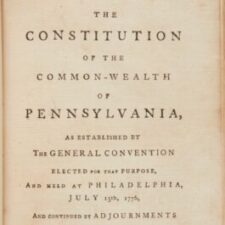 One of the most important factors in maintaining newspaper notice is the strength of the relationships between local publishers and their representatives in the state legislature. The relationships don’t need to be particularly close. They don’t even need to be politically harmonious as long as there is a baseline of trust. Public officials who can put a face to their local paper are much more likely to consider its policy concerns.
One of the most important factors in maintaining newspaper notice is the strength of the relationships between local publishers and their representatives in the state legislature. The relationships don’t need to be particularly close. They don’t even need to be politically harmonious as long as there is a baseline of trust. Public officials who can put a face to their local paper are much more likely to consider its policy concerns.
Stop disparaging public notice advertising!
 Pay close attention to reporting on public notice issues and you may begin to observe that some papers have adopted certain rhetorical habits that tend to undermine the goal of preserving newspaper notice. They’re mostly innocent mistakes made by people who are unaware that what they’re doing may be counterproductive. But it’s fair to say that if those habits could be eliminated it might enhance the policy environment for maintaining newspaper notice.
Pay close attention to reporting on public notice issues and you may begin to observe that some papers have adopted certain rhetorical habits that tend to undermine the goal of preserving newspaper notice. They’re mostly innocent mistakes made by people who are unaware that what they’re doing may be counterproductive. But it’s fair to say that if those habits could be eliminated it might enhance the policy environment for maintaining newspaper notice.
Don’t hide your online notices!
 Most newspapers now publish notices on their website in addition to print, even in states that don’t require it. As we’ve written before, it’s one of the most important things publishers can do to help their state’s press association protect newspaper notice.
Most newspapers now publish notices on their website in addition to print, even in states that don’t require it. As we’ve written before, it’s one of the most important things publishers can do to help their state’s press association protect newspaper notice.
However, too many publishers still make it difficult for users to find the notices that are posted on their website. Last week we spotted a perfect illustration of the phenomenon.
The Westerly Sun published an editorial (“In defense of legal notices”) arguing against legislation that has been introduced in Rhode Island’s General Assembly that would allow local governments to publish notices on their websites in lieu of print newspapers. A website visitor quickly added a helpful suggestion in the comments section below the article.
The newspaper industry’s challenge
 A recent column on the nonprofit news website the Pennsylvania Capital-Star argues that Pennsylvania voters should receive more notice about proposed amendments to the state’s Constitution advanced by Republican lawmakers this year. The column’s author, Patrick Beaty, believes the notice requirements set by the Constitution are insufficient.
A recent column on the nonprofit news website the Pennsylvania Capital-Star argues that Pennsylvania voters should receive more notice about proposed amendments to the state’s Constitution advanced by Republican lawmakers this year. The column’s author, Patrick Beaty, believes the notice requirements set by the Constitution are insufficient.
We have no position on the substance of the amendments or on Beaty’s call for more transparency surrounding the amendment process.
Nevertheless, his column offers an excellent illustration of a major challenge facing the newspaper industry: To reframe the debate around public notice by helping people understand that notices published in newspapers are also published on newspaper websites.
PNRC: Newspapers must post notices on the web
 One of the most important steps newspaper publishers can take to ensure newspapers continue to remain the exclusive vehicle for public notice is to expand the audience for those notices by posting them on their own website and on their state press associations’ statewide public notice website.
One of the most important steps newspaper publishers can take to ensure newspapers continue to remain the exclusive vehicle for public notice is to expand the audience for those notices by posting them on their own website and on their state press associations’ statewide public notice website.
Just ask Nebraska Press Association Executive Director Dennis Derossett, who says that having a statewide website where members can post their notices — and supporting a law requiring them to do so — helped NPA convince lawmakers to increase the rates paid for those notices (see story below).
Poor customer service a threat to newspaper notice
 Article III, Section 13(A) of Louisiana’s Constitution requires legislators to publish two notices in a local paper when they plan to introduce a “local or special law” in the state legislature. The notices must “state the substance of the contemplated law, and every such bill shall recite that notice has been given.”
Article III, Section 13(A) of Louisiana’s Constitution requires legislators to publish two notices in a local paper when they plan to introduce a “local or special law” in the state legislature. The notices must “state the substance of the contemplated law, and every such bill shall recite that notice has been given.”
So: No notice, no bill.
Some Louisiana lawmakers may have been prevented from introducing local bills this year due to a lack of notice. We know this because — much to the chagrin of the Louisiana Press Association (LPA) — it became a topic of discussion in the legislature during discussions over Senate Bill 101, which authorized self-storage facilities to advertise lien sales “on a publicly accessible website that conducts personal property auctions” in lieu of a newspaper.
Doing it right: Providing third-party oversight
 “Don’t let the fox guard the henhouse!” we warn legislators when they consider moving public notices from newspapers to government websites. There’s too much incentive for governments to hide notices if the responsibility for their publication is left solely to them, the argument goes. Newspapers are the independent publisher the public needs to ensure official notices actually see the light of day.
“Don’t let the fox guard the henhouse!” we warn legislators when they consider moving public notices from newspapers to government websites. There’s too much incentive for governments to hide notices if the responsibility for their publication is left solely to them, the argument goes. Newspapers are the independent publisher the public needs to ensure official notices actually see the light of day.
But the argument only works if newspapers guard the henhouse by providing oversight of the notices their government clients are statutorily required to publish.
